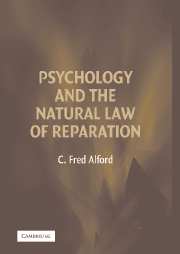2 - Young People, Relativism, and the Natural Law
Published online by Cambridge University Press: 24 July 2009
Summary
Based on my research – hour long interviews with thirty young people – I uncovered no yearning for dark Eros. To do so would require hours of in-depth psychological research with each subject, and besides the interview room is not the right place to look. Look at Abu Grabe. Read the history of the twentieth century, the bloodiest in world history, over 100 million killed in armed conflict, over 170 million if one includes “democide,” such as the 40 million (or more) Russian deaths ordered by Stalin. Does not, Freud wondered, every human long for death? First one seeks the death of others. Young men march off to war; the rest of us read about it excitedly in the newspapers (Freud 1915). Old men and women seek their own death (even as most think they are postponing it, if they think about it at all), as though the goal of life itself were silence, sleep, night, death – the cessation of all stimulation. This is the thesis of the Todestrieb, the death drive posited by Freud (1920) in order to explain the longing for stasis that seems to lie beyond the pleasure principle.
What I wanted to discover and explain was something quite different. Not the presence of Antigone's dark Eros in each of us, but something far more superficial, indeed banal: the relativism of the young that MacIntyre (2000), Alan Bloom (1988), and Russell Hittinger (2003), among many others have asserted, a relativism that makes natural law, including reparative natural law, irrelevant.
- Type
- Chapter
- Information
- Psychology and the Natural Law of Reparation , pp. 23 - 60Publisher: Cambridge University PressPrint publication year: 2006
- 1
- Cited by

